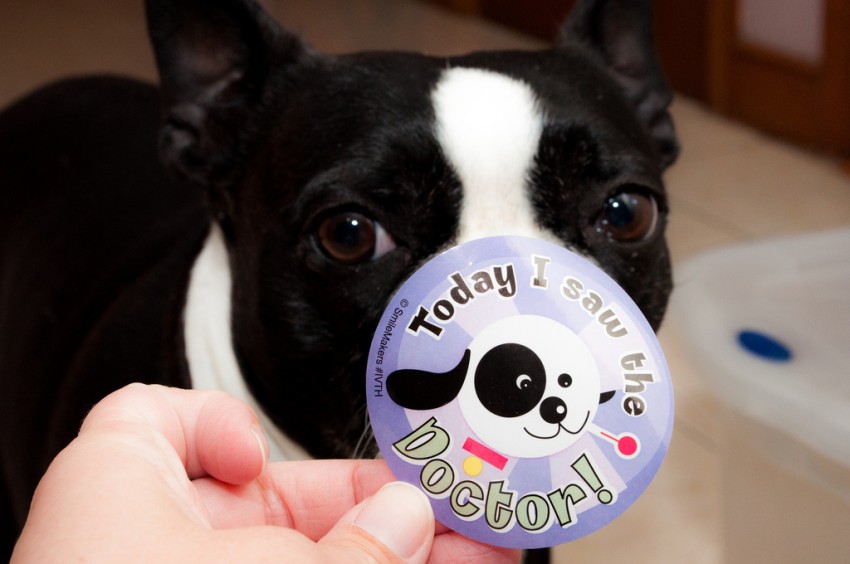This pet health content was written by a veterinarian, Dr. Debora Lichtenberg, VMD. It was reviewed for accuracy by Dr. Pippa Elliott, BVMS, MRCVS, and was last updated on September 5, 2024

How Expired Pet Medications Can Help in Non-Emergency Situations
Veterinarians receive many emergency calls after hours, but most of these are not true emergencies. About 80 percent of the time, the pet doesn’t need immediate treatment. In these cases, a veterinarian might offer advice similar to “Take 1 aspirin and call me in the morning” or “Take nothing and see me in the morning.”
In such situations, it’s important to:
- Discuss what expired pet medications or other medications you may have at home that could provide comfort.
- Keep in mind that your vet might not be able to access your pet’s full medical history late at night.
Having your pet’s medications, including expired pet medications, readily available can help jog your vet’s memory during an after-hours call.
Understanding the Usefulness of Older Expired Pet Medications
While we are often told to dispose of unused portions of medications, most people don’t follow through. This can be understandable given the cost of many medications and the chronic conditions that some pets face. However, before using older or expired pet medications, it’s crucial to call your vet for advice.
Here are some key points to consider:
- Expiration dates exist for a reason: Although most expired medications may not be harmful, they could be ineffective.
- Keep medications in their original bottles: This ensures you have the date dispensed and helps your vet determine if the medication is still safe to use.
- Liquid medications: These tend to have shorter shelf lives. Common examples, such as Amoxidrops or Clavamox, become useless after 10 to 14 days.
- Antibiotics: These should always be given as prescribed. Unless there’s an adverse reaction, finish the entire prescription.
Other medications, like pain relievers or anti-diarrheals, may still be useful if properly stored, but always check with your vet first.
Why You Should Always Ask Before Administering Expired Pet Medications
When you find your pet’s medications during a late-night advice call, it’s essential to ask your vet before giving any previously dispensed medication, especially if you’re unsure what it’s for.
Here are some common mistakes that happen during such calls:
- “I couldn’t remember if it was the pink pill or the green one, so I gave the green one.”
- “Fluffy passed away 2 years ago, but Buffy was sick like Fluffy, so I gave Buffy Fluffy’s medicine. That was OK, right?”
These types of scenarios, especially in the middle of the night, can quickly turn into what we call a veterinary nightmare. Avoid this by always asking your vet before giving any medication to your pet.
Tip: Notate on the vial why the medication was prescribed to prevent confusion later.
Essential Items to Keep in Your Pet’s Medicine Cabinet`
Petful recommends keeping a few essential products on hand for minor medical situations. These over-the-counter drugs, along with guidance from your vet, can be helpful in emergencies:
- Benadryl: Can be used for allergic reactions or to reduce itching until your pet can be seen by a vet.
- Pepcid AC: Generally safe for mild GI upset when your pet is not in severe distress, but always confirm with your vet.
- Hydrocortisone cream: Useful for insect bites or hot spots to provide relief until professional care is available.
- Triple antibiotic ointment: Ideal for minor cuts and scrapes to prevent infection.
For more guidance, check out this list of products that can help in pet emergencies.
In this video, Dr. Greg Martinez, DVM, discusses allergic reactions and dosage guidelines for over-the-counter antihistamines:
Limit the Use of Expired Pet Medications to Short-Term Situations
All of the above advice and medications are intended for short-term use — typically 1 or 2 times only. You should stop the medication either because your pet has recovered or because you are bringing them to the vet in the morning.
In any case, avoid using expired pet medications or any other meds for an extended period without a proper diagnosis from your veterinarian.
Frequently Asked Questions (FAQ)
Can you use expired pet medication?
It’s not recommended to use expired pet medication without consulting your vet, as it may be ineffective or unsafe.
What medications are harmful after expiration date?
Liquid medications and antibiotics can be harmful or lose effectiveness after their expiration date.
How long is pet medicine good for?
Most pet medications are good until their expiration date, which can vary depending on the type of medication.
How long after expiration date can you take medicine?
It’s unsafe to use pet medicine after the expiration date without consulting your vet, as its effectiveness may be compromised.



